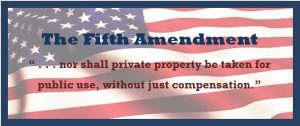 In a 5-4 ruling today, written by Chief Justice Roberts, the United States Supreme Court overturned a 1985 decision which had made claims for the taking of private property far more difficult to pursue in federal court. In many ways, today’s ruling in Rose Mary Knick v. Township of Scott, Pennsylvania, 588 U. S. ____ (2019), represents a significant “back to the future” moment that should benefit landowners.
In a 5-4 ruling today, written by Chief Justice Roberts, the United States Supreme Court overturned a 1985 decision which had made claims for the taking of private property far more difficult to pursue in federal court. In many ways, today’s ruling in Rose Mary Knick v. Township of Scott, Pennsylvania, 588 U. S. ____ (2019), represents a significant “back to the future” moment that should benefit landowners.
The Knick decision is notable in the context of regulatory takings, cases where landowners believe that local governments have “taken” their property through conditions or regulations imposed on the use or development of their land. This is particularly significant in the harsh legal and regulatory environment of California. No longer is a landowner claiming a regulatory taking required to first seek relief in state court before going to federal court to claim a taking under the Fifth Amendment of the U.S. Constitution. And no longer will that California takings litigant find that it not only could not begin its federal takings claim in federal court, but also that it very well may be precluded from filing in federal court if it loses that first round in state court.
In Knick, the Court wiped out the “state-litigation requirement” of Williamson County Regional Planning Comm’n v. Hamilton Bank of Johnson City, 473 U. S. 172 (1985). Williamson had required that a person claiming a taking under the U.S. Constitution must first pursue relief under state law in state court before it could bring its claim in federal court. Noting that takings plaintiffs were unique among plaintiffs asserting constitutional claims because they could not initiate their claims in federal court, the Supreme Court ruled that it will now “allow into federal court takings claims that otherwise would have been brought as inverse condemnation suits in state court.”
The Court emphasized that a taking is final and compensable when it occurs. There is no need to enjoin or invalidate a regulation that results in a taking, because a damages award under §1983 of the Civil Rights Act from a federal court will make the landowner whole. The practical implication of this statement is that while local governments “need not fear that our holding will lead federal courts to invalidate their regulations as unconstitutional,” those local governments now must fear that simply undoing the regulation that caused the taking will not be an option. If the court finds that there has been a regulatory taking, the regulation stays in place. The local government, however, must dig into its pocket to compensate the landowner. In other words, the local government’s transgression is not the adoption of the regulation resulting in the taking, but rather the failure to provide the “just compensation” to the landowner for that taking.
As a result of the Knick decision, it is likely that prudent City Attorneys and County Counsel will be advising their clients that there is no turning back from a regulatory taking. If a federal court agrees with the landowner that a taking has occurred, the only remedy is payment to the landowner. Perhaps some local governments will be less eager to push the envelope when it comes to regulatory takings. Time will tell.
 Lay of the Land
Lay of the Land

